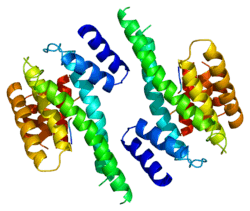
YWHAZ
14-3-3 protein zeta/delta (14-3-3ζ) is a protein that in humans is encoded by the YWHAZ gene on chromosome 8. The protein encoded by this gene is a member of the 14-3-3 protein family and a central hub protein for many signal transduction pathways. 14-3-3ζ is a major regulator of apoptotic pathways critical to cell survival and plays a key role in a number of cancers and neurodegenerative diseases.
Structure
14-3-3 proteins generally form ~30 kDa-long homo- or heterodimers. Each of the monomers are composed of 9 antiparallel alpha helices. Four alpha-helices (αC, αE, αG, and αI) form an amphipathic groove that serves as the ligand binding site, which can recognize three types of consensus binding motifs: RXX(pS/pT)XP, RXXX(pS/pT)XP, and (pS/pT)X1-2-COOH (where pS/pT represents phosphorylated serine/threonine). In addition to these primary interactions, the target protein can also bind outside the groove via secondary interactions. In particular, the crystallized structure of 14-3-3ζ forms a cup-shaped dimer when complexed with CBY. The YWHAZ gene encodes two transcript variants which differ in the 5' UTR but produce the same protein.

